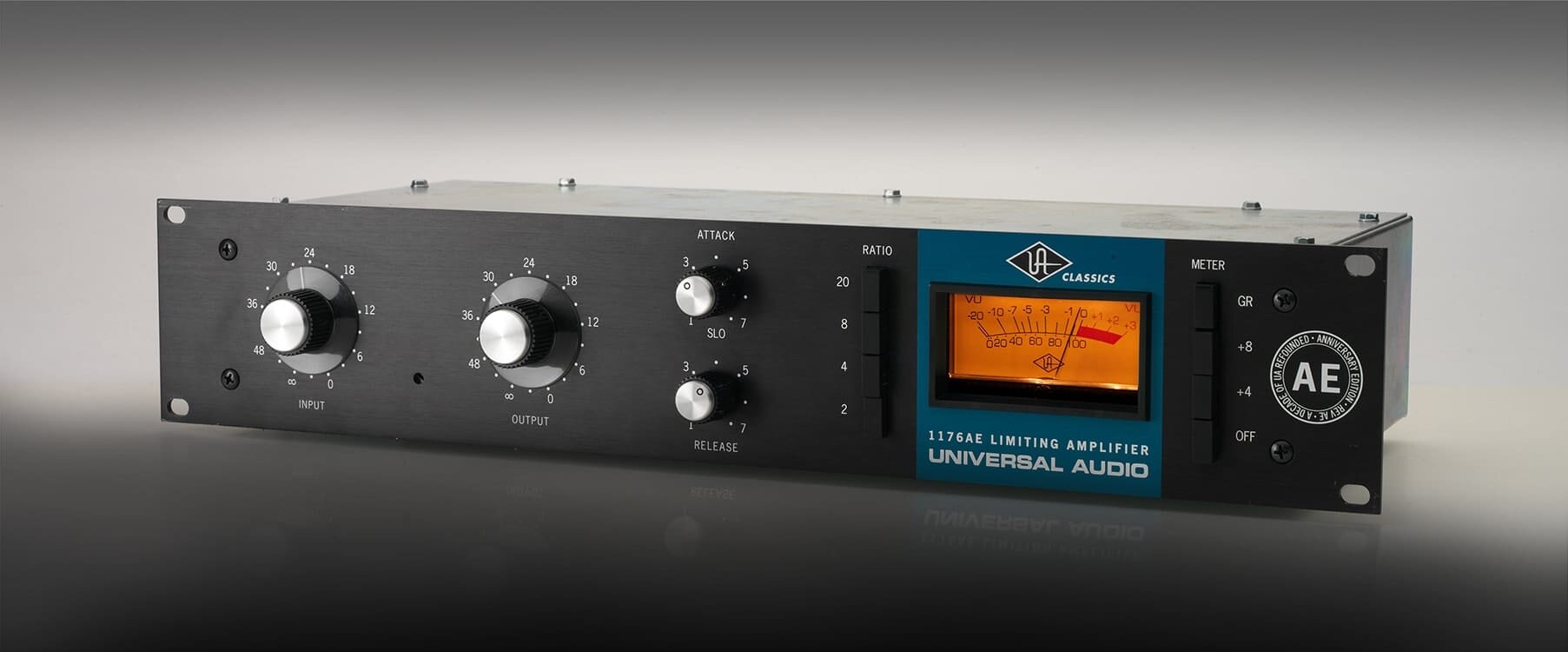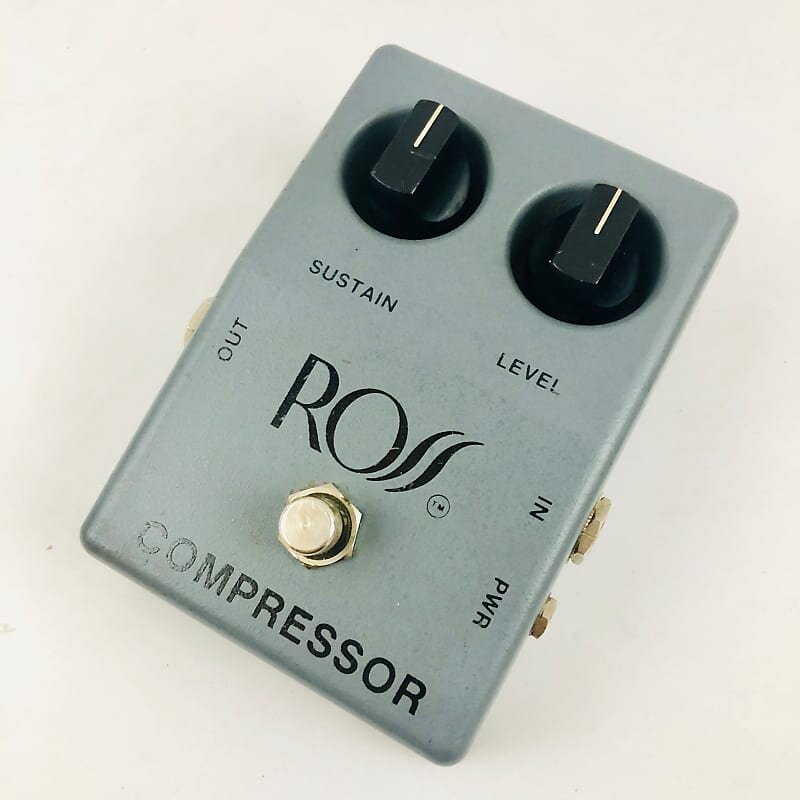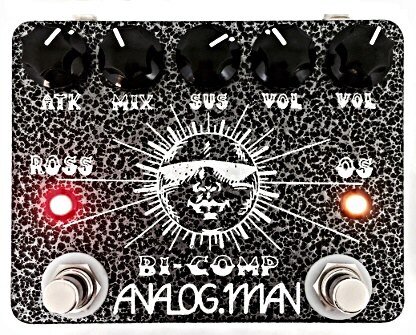Analog Man CompROSSor pedal with RYCK mod
Compression is often misunderstood and looked at as a dynamics fixer. Meaning, some players use them to even out there playing. A compressor can substantially narrow the dynamic range of the guitar.
Although it does do that, it's not how I think about it, or I use it. I've spent a lot of time playing guitar to manually event my dynamics if I want to. I don't use a compressor as a band-aid.
Compression is a tone tool for me. I'm very interested in the varieties of compressors and how they modify my sound. Sure, a compressor is still containing the dynamic range of the guitar. But, to me, that's just a side effect.
1176 compressor
Recording engineers are hip to the colors that various compressors can add. You might catch an engineer using an Urei 1176 or Fairchild compressor with almost no compression to add some "character."
The pedal compressors I have in my collection are all picked for a similar reason. I have compressors that I can squish the signal if I want that sound, but also compressors that have a specific flavor even if barely compressing.
Analog Man CompROSSor
Compression is an essential ingredient when playing and recording Rickenbacker 12 string guitars. The right compressor can add sustain and unique bell-like quality.
I wrote an article on turning a modern Rickenbacker into a vintage sounding one, restoring included changing the writing, pots, and new pickups. My reference was a 1963 Rickenbacker 360-12. Just like the one George Harrison played.
My Rickenbacker story wouldn't be complete, however, without talking about compression. Analog Man makes such a pedal specifically with the Rickenbacker 12 string in mind.
Rickenbacker 360 12 string
Well, let me specify. Analog Man offers some mods to his compROSSor that are specific for a Rickenbacker. They are not limited to using a Rickenbacker 12 string; they help embellish one.
A Rickenbacker 12 string is a unique guitar. A few things you will notice when using just any old compressor with a Rick 360 12.
1: The tone becomes dull. Some compressors will shave off some of the presence of your signal. Chime is a significant component of a Rickenbacker, and a reduction in that isn't desirable.
Chimney Vox AC15
2: Loss of percussiveness. Part of the jangle tone of a Rickenbacker lies in the percussiveness of the instrument. A compressor that has too fast an attack will take away that percussiveness because it doesn't allow any of the transient to come through.
Ideally, you would have a compressor that will allow you to adjust both the treble and attack time of the compressor, which brings me back to the Analog Man compROSSor with Ryck mod. It's Analog Man's copy of the Ross compressor circuit with a mod to allow more high end to come through and adjustable attack time. Solves both of the issues we encounter with compression and a Rickenbacker.
“The compROSSor allows us to get into classic Byrds tones.”
The compROSSor allows us to get into classic Byrds tones. But, the compROSSor isn't only suitable for Byrds Rickenbacker tone. It can be used in its standard state without the mods for all traditional compression duties.
Analog Mike kept the circuit pretty identical to the original Ross, except for making it less noisy, which is a welcome update. The fact it's quieter allows me to use it in higher gain situations.
As I mentioned, I like to use a compressor for tone. I may place the compROSSor after a drive or fuzz. Yes, I did say after. I know, the good book of pedal placement has its first commandment of placing the compressor pedal first in your chain.
Germanium Maestro FZ-1A fuzz
But, just like borders, these rules are only human-made. First, I never place a compressor before my fuzz pedals. Especially a germanium fuzz. Fuzz is always first. I even put my fuzz pedals before my tuner as a few of the old germanium style circuits I have can be a little cranky just like the author.
Placing a buffer or sometimes any pedals before a germanium fuzz creates a nondesirable reaction. You may notice losing dynamics when rolling back your volume knob or an increase in the treble.
Placing a fuzz pedal first is about the only rule I regularly follow. From here, the future is unwritten. For me, the heavier I compress, the earlier I'm the chain I put it. But, that's just a light suggestion. Be creative!
“Placing a compressor after an overdrive allows you to simulate amp compression. ”
Placing a compressor after an overdrive allows you to simulate amp compression. Handy for when you're playing at low volumes and can't get your amp loud enough to compress naturally.
Volume boost
Using a compressor as a volume boost for solos is a fresh alternative to a boost pedal or tube screamer. You can either place it before or after an overdrive depending on if you want to push the overdrive harder for more gain or raise your volume.
In these situations, I tend not to compress a ton. Gentle compression to add some sustain and volume will e; evade your solo.
Driving an amp
Marshall SV20H Plexi
There are times I plug straight into an amp, which is often the case with Marshall Plexi amps. I get all of my gain from the amp. Using a nice compressor like the compROSSor allows me to push the amp into more drive.
I may also push a Marshall into saturation more with an overdrive or boost pedal. Each method sounds different and allows specific flavors.
Country squish
At this point, it's no secret that compression is a significant ingredient of country music. The most basic country recipe is a Telecaster, compressor, and a Blackface Fender amp. Country music is a situation that often calls for a fair amount of compression. Compression brings out the twang and snap of a Tele.
The Analog Man compROSSor excels in all of these areas. In my opinion, that's pretty rare for a compressor.
Quiet Please
I have found a lot of compressors to be noisy. Look, no matter what compressor you use, the noise floor is going to be raised. It's the nature of the beast. The circuit of the compressor and the quality of the components will determine the noise floor.
“I can run the compROSSor into a Marshall Plexi and not be scared by the noise floor. ”
I can run the compROSSor into a Marshall Plexi and not be scared by the noise floor.
The compROSSor lives in an exciting place of it being transparent and colored at the same time. It's not a compressor whose tone takes over your guitar identity.
The compROSSor is also not a pedal that goes unnoticed at a party. It seems to add the right amount of color without being domineering.
Transparent
I've talked about this in another blog, but since I still have my soapbox, I may as well get back on it.
I find the world transparent to be a word people in the music community use to sell snake oil.
Nothing is truly transparent. The Wampler Ego often gets called a transparent compressor. I found it colored and I didn't personally like it. Transparent gets used to imply not tube-like tone. But solid-state has just as much color as tubes. It's just that some players like a particular flavor more then others and have bought into the idea that things don't color their tone.
The CompROSSor doesn't sound sterile like the Ego compressor or add as much flavor to your signal as the Effectrode PC-2A. There is a pleasing balance.
A Stand Out
The Analog Man compROSSor isn't my first compressor built from the Ross circuit. I have an old Keeley two-knob compressor, which is a pedal loved by many players. For some reason, I never bonded with it. It's a lot noisier than the compROSSor. It wasn't a great pairing for my applications. But, gear is like underwear. It comes down to personal choice.
Like a feather
I'm impressed with how light analog man pedals are. I have several, and each one is very light compared to other pedals. Mike is a gigging musician. He seems to understand the guitarist's mindset — not only from a tone perspective but a weight and pedalboard footprint perspective.
Overall I think the compROSSor is a winner. I would also add that it's also worth looking into the Analog Man Bi-Comp as well, depending on your applications.
Let's listen to some examples of the compROSSor:
















